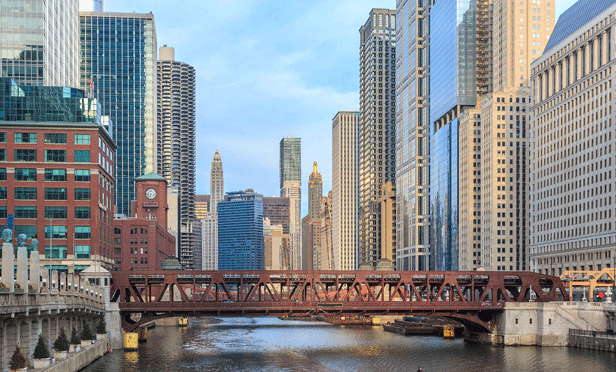CHICAGO—As reported yesterday in GlobeSt.com, according to a new report by Savills Studley the office market in Chicago's CBD has finally returned to a pre-recession vacancy rate. In the third quarter, the overall availability rate fell by 100 bps to 15.0%, the lowest since the end of 2008. The drop in vacancy was also notable in the class A sector. Availability dipped 90 bps to 14.3%, also the lowest it has been since 2008.
“The downtown market continues to be robust, with the West Loop and River North continuing to be at the apex of the most sought after submarkets,” Robert Sevim, executive managing director of Savills Studley, tells GlobeSt.com. Not only has activity among tenants increased, owners in the CBD continue to show interest both in selling their properties, raising the possibility of new investment, and in making the renovations necessary to attract new users. And with developers getting ready to introduce new class A space, the downtown office market should remain vibrant for an extended period.
Office-using employment in the Chicago region has expanded significantly in the last twelve months, for example, increasing by 1.7% from a year ago, and now sits just 1.0% below its pre-recession peak. “Unlike five years ago, business today are more confident in their ability to look forward.” Tech firms especially have begun taking down spaces large enough to accommodate future growth, and even tenants with leases that expire in 2020 are beginning to consider options.
The delivery of new West Loop office towers such as River Point and 150 N. Riverside Plaza in 2017 will set in motion much of this movement. Although these trophy buildings have secured anchors, “what you will soon start to see is the second wave of tenants” signing up for space, Sevim says. “There will be a cascading effect. I think this will breed a lot of activity.”
“Typically, tech companies have not focused on traditional glass and steel buildings,” Sevim adds. “That said, we're seeing a reduction in opportunities for them to rent in brick-and-timber buildings,” a type common in River North. Therefore, he's noticed that as loft space continues to dwindle, landlords in CBD are repositioning their space to appeal to both tech companies and more traditional businesses by offering comprehensive amenities such as fitness centers, wifi capabilities and even roof decks. In turn, he says tech companies are realizing that these buildings provide an alternative solution that can enable the creative workspace they desire.
And in general, the amenities landlords are providing are helping users attract new talent. For example, as recently reported in GlobeSt.com, Berkley Properties and 601W Companies, which gained control of One Prudential Plaza in 2013, have committed nearly $85 million to update the nearly 60-year-old East Loop tower. And the new features, including a 13,000-square-foot rooftop deck with a fire pit overlooking Millennium Park, a 12,000-square-foot fitness center and 7,000-square-foot clubhouse, were instrumental in attracting new tenants such as Cision, a provider of public relations software and services. This willingness among CBD landlords to do what it takes “isn't necessarily as ubiquitous in other large US markets,” Sevim says.
Furthermore, “with another set of class A assets with a combined value of nearly $2.0 billion about to hit the market, investment sales should remain steady in the next few months,” according to the third quarter report from Savills Studley. The firm believes that the 1.2-million-square-foot 353 N. Clark St. could soon command more than $700 million. And many other CBD office towers, such as 55 E. Monroe, which could sell for $380 million, have commenced sales proceedings. “It's an indication of how strong the capital markets are right now,” Sevim says.
Want to continue reading?
Become a Free ALM Digital Reader.
Once you are an ALM Digital Member, you’ll receive:
- Breaking commercial real estate news and analysis, on-site and via our newsletters and custom alerts
- Educational webcasts, white papers, and ebooks from industry thought leaders
- Critical coverage of the property casualty insurance and financial advisory markets on our other ALM sites, PropertyCasualty360 and ThinkAdvisor
Already have an account? Sign In Now
*May exclude premium content© 2024 ALM Global, LLC, All Rights Reserved. Request academic re-use from www.copyright.com. All other uses, submit a request to [email protected]. For more information visit Asset & Logo Licensing.








